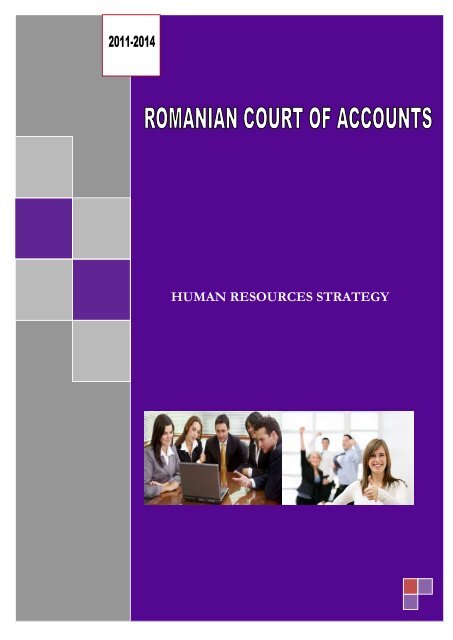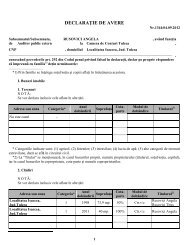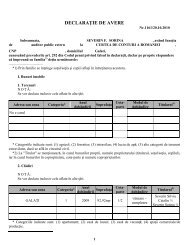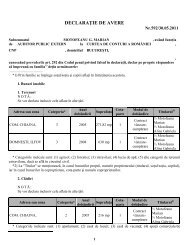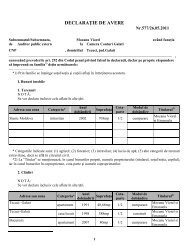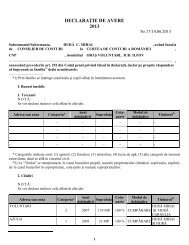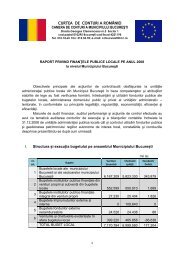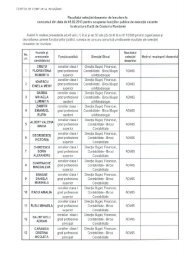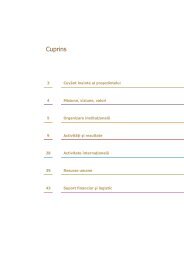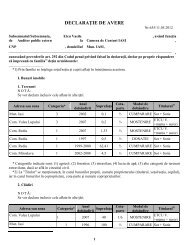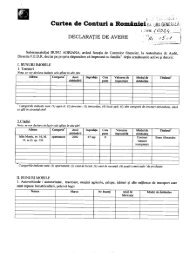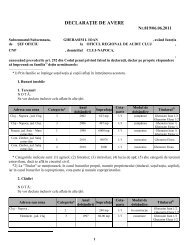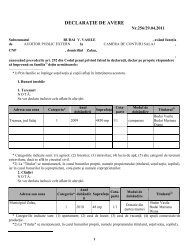Human resources strategy - Curtea de Conturi
Human resources strategy - Curtea de Conturi
Human resources strategy - Curtea de Conturi
Create successful ePaper yourself
Turn your PDF publications into a flip-book with our unique Google optimized e-Paper software.
1/23<br />
HUMAN RESOURCES STRATEGY<br />
â<br />
<strong>Human</strong> Resources Strategy of the Romanian Court of Accounts
2/23<br />
TABLE OF CONTENTS<br />
I. Context and aim of the Court of Accounts’ <strong>Human</strong> Resources<br />
Strategy for the period 2011 - 2014<br />
3<br />
II. The Court of Accounts’ Mission, Vision and Values in the field of<br />
<strong>Human</strong> Resources<br />
6<br />
III. Current activity involving <strong>Human</strong> Resources 8<br />
3.1 Organization and structure of <strong>Human</strong> Resources 8<br />
3.2 Culture and organisational change 8<br />
3.3 Priorities for mo<strong>de</strong>rnising activities within the HR Strategy 9<br />
IV. General strategic objective, specific strategic objectives, related<br />
strategic measures and specific actions to enforce specific strategic<br />
objectives<br />
10<br />
V. Implementing strategic objectives 23<br />
<strong>Human</strong> Resources Strategy of the Romanian Court of Accounts
3/23<br />
I. Context and aim of the Court of Accounts’ <strong>Human</strong> Resources Strategy<br />
for the period 2011-2014<br />
Context<br />
In keeping with the INTOSAI Gui<strong>de</strong> on the institutional<br />
capacity building of Supreme Audit Institutions, drafted in 2007<br />
by the members of Sub-Committee 1 on institutional capacity<br />
strengthening, chaired by the National Audit Office of Great<br />
Britain, there are a number of areas concerning <strong>Human</strong> Resources<br />
(HR) which are important in terms of ensuring that the RCoA<br />
provi<strong>de</strong>s a high quality service.<br />
The Gui<strong>de</strong> states that „capacity” means the skills, knowledge,<br />
structures and ways of working that make an organisation<br />
effective. Building capacity means <strong>de</strong>veloping further each of<br />
these, building on existing strengths, and addressing gaps and<br />
weaknesses. This HR Strategy seeks to <strong>de</strong>fine the ways in which<br />
this will be done, in the short and medium term (covering the<br />
period 2011-2014) .<br />
The Gui<strong>de</strong> consi<strong>de</strong>rs certain more <strong>de</strong>tailed topics where<br />
capacity building has direct HR consequences. Three categories of<br />
capacity building are i<strong>de</strong>ntified, namely professional audit<br />
capacity, organisational capacity and capacity to <strong>de</strong>al with the<br />
external environment.<br />
Analysing these further, the following issues have very<br />
significant HR impact:<br />
- Developing/training staff<br />
- Work planning and management<br />
- Quality assurance<br />
- Forward planning<br />
- Lea<strong>de</strong>rship<br />
- Managing <strong>resources</strong><br />
This HR Strategy follows on from the <strong>de</strong>velopment of the<br />
Institutional Development Strategy, which i<strong>de</strong>ntified a number<br />
of crucial HR-related activities that nee<strong>de</strong>d to be taken. In<br />
many ways, the <strong>de</strong>livery of all seven strategic objectives in the<br />
Institutional Development Strategy is impacted by HR activities,<br />
but there are two in particular where this is strongly the case.<br />
These are specific objective 4 in the Institutional<br />
Development Strategy which inclu<strong>de</strong>s elements on making<br />
managerial and support processes more efficient and specific<br />
objective 6 which looks at increasing the professionalism of<br />
<strong>Human</strong> Resources Strategy of the Romanian Court of Accounts
4/23<br />
specialised staff in the RCoA. This latter objective has a number of<br />
actions i<strong>de</strong>ntified which involve various elements concerning<br />
training. These are <strong>de</strong>veloped in more <strong>de</strong>tail in this HR Strategy.<br />
The HR Strategy is also linked to those <strong>de</strong>veloped<br />
specifically for Communication and IT. For example, improved<br />
soft skills which are one objective for this HR Strategy will<br />
potentially enhance the ability to communicate effectively.<br />
Similarly, reference is ma<strong>de</strong> in this HR Strategy to elements of the<br />
IT system that relate to HR information.<br />
It is critical that it is recognised that the <strong>de</strong>sign,<br />
<strong>de</strong>velopment and implementation of the HR Strategy is not the<br />
responsibility of the HR Department. Rather it is the role of every<br />
Counsellor of Accounts, Director and employee to play their<br />
part in ensuring that the Strategy is successfully implemented.<br />
This inclu<strong>de</strong>s for example ensuring that there are robust<br />
performance appraisal systems in place which Counsellors of<br />
Accounts and Directors use as a means of ensuring that all<br />
employees are performing at a high level, that good performers are<br />
highlighted for potential promotion opportunities and that issues of<br />
poor performance are properly addressed.<br />
It is vital that a Supreme Audit Institution (SAI) operates at<br />
high quality. The arguments for achieving excellence are more<br />
compelling for SAIs than for other institutions because of the<br />
nature of their work: judging the actions of others. The reputation<br />
of an SAI is based on the quality of its output. It can achieve<br />
respect and authority only if it is managed to high standards. This<br />
requires that every employee of the RCoA performs to these high<br />
standards and that proper measures are in place to monitor this and<br />
take corrective action as necessary.<br />
Having reviewed the current situation of the RCoA and<br />
consi<strong>de</strong>red its strengths and weaknesses, this <strong>strategy</strong> provi<strong>de</strong>s a<br />
high-level plan of action for strengthening the organisation in the<br />
following areas:<br />
- Staff selection and recruitment<br />
- Personnel performance assessment and evaluation<br />
mechanisms<br />
- Retention and promotion of staff<br />
- The Co<strong>de</strong> of Ethics<br />
- Training and continuous professional <strong>de</strong>velopment<br />
- The HR IT System<br />
- Organisational Structure<br />
<strong>Human</strong> Resources Strategy of the Romanian Court of Accounts
5/23<br />
Aim<br />
The effective and efficient use of <strong>Human</strong> Resources is a<br />
crucial part of the activities of the RCoA. As part of the<br />
ongoing integration process into the EU it is important that best<br />
European practices adopted elsewhere are also implemented in<br />
Romania.<br />
In this context, the significant reconfiguration of the<br />
characteristics and composition of human <strong>resources</strong> activity<br />
becomes essential and the adoption of a clear vision for the<br />
RCoA HR Strategy has to be ma<strong>de</strong>.<br />
The key elements of this <strong>strategy</strong> are: professionalism,<br />
effectiveness and efficiency, seen as a complex of interrelated<br />
factors that support and reinforce each other, in or<strong>de</strong>r to ensure<br />
that the interests of individual and organizational <strong>de</strong>velopment are<br />
met and to increase the <strong>de</strong>gree of society’s confi<strong>de</strong>nce in the<br />
RCoA’s activities and outputs.<br />
The <strong>strategy</strong> aims to improve human <strong>resources</strong><br />
management by stating a clear set of specific strategic objectives<br />
for each field of interest, related strategic measures and a group<br />
of specific actions by which these may be achieved.<br />
<strong>Human</strong> Resources Strategy of the Romanian Court of Accounts
6/23<br />
II. The Court of Accounts’ Mission, Vision and Values in the field of<br />
<strong>Human</strong> Resources<br />
Mission<br />
In or<strong>de</strong>r to effectively perform its activity, the Court of<br />
Accounts <strong>de</strong>pends on the knowledge, skills, expertise and<br />
motivation of its staff. Staff training and the <strong>de</strong>velopment of both<br />
employees and the RCoA as a whole are crucial in creating the<br />
right work environment and organizational culture to lead to the<br />
attainment of high levels of professionalism and quality.<br />
In response to the challenges presented by these<br />
objectives, the RCoA will <strong>de</strong>sign and <strong>de</strong>liver human <strong>resources</strong><br />
policies, systems, strategies and plans to implement ongoing<br />
<strong>de</strong>velopmental activities and enhanced organizational learning.<br />
The overall HR mission is to have in place a package of<br />
HR measures that will <strong>de</strong>liver high quality performance by<br />
the RCoAs employees and by the organization as a whole.<br />
These measures will cover the full range of HR activities, namely<br />
staff selection and recruitment, personnel performance<br />
assessment and evaluation mechanisms, the retention and<br />
promotion of staff, training and continuous professional<br />
<strong>de</strong>velopment, the robustness and effective implementation of the<br />
Co<strong>de</strong> of Ethics, the HR IT System and the organisational<br />
Structure and Administration.<br />
All these factors must work together to produce a high<br />
level of quality and effectiveness on the part of its staff and of the<br />
organisation as a whole. This supports the <strong>de</strong>livery of the RCoA’s<br />
key goals, particularly that of „strengthening the institutional<br />
capacity of the Romanian Court of Accounts as an in<strong>de</strong>pen<strong>de</strong>nt,<br />
professional and trustworthy institution concerning external audit<br />
of public funds”.<br />
To support this objective, the RCoA will <strong>de</strong>liver good<br />
quality training, encourage the appropriate behaviours of<br />
employees, ensure that it has an organizational <strong>de</strong>sign that<br />
provi<strong>de</strong>s a suitable framework to operate as an effective and<br />
efficient institution and en<strong>de</strong>avour to employ individuals with the<br />
requisite skills and attitu<strong>de</strong>s to become successful employees. It<br />
will aim to motivate good performance and address issues of<br />
un<strong>de</strong>r-performance in an open and positive manner. Applied<br />
properly, these measures will have a strong impact on individual<br />
and organizational performance and behaviours.<br />
<strong>Human</strong> Resources Strategy of the Romanian Court of Accounts
7/23<br />
Vision<br />
The aim of the vision statement is to summarise in an<br />
inspiring and succinct way the <strong>de</strong>sired outcome of the HR<br />
<strong>strategy</strong>. In terms of the RCoA, it can be stated as the<br />
<strong>de</strong>velopment of high quality, well motivated, suitably trained<br />
and effectively led auditors and support staff working within<br />
a supportive and appropriate organizational structure that<br />
enables the RCoA to <strong>de</strong>liver outstanding outcomes for the<br />
public.<br />
Values<br />
As <strong>de</strong>fined in the Institutional Development Strategy, our HR<br />
values encompass in<strong>de</strong>pen<strong>de</strong>nce, objectivity, professionalism,<br />
responsibility, efficiency, integrity, transparency, impartiality<br />
and political equidistance.<br />
<strong>Human</strong> Resources Strategy of the Romanian Court of Accounts
8/23<br />
III. Current activity involving <strong>Human</strong> Resources<br />
3.1. Organization and structure of human <strong>resources</strong><br />
There are 1,134 speciality and 298 support staff within the RCoA<br />
(2010 Activity Report). There are 18 Counsellors of Accounts who are<br />
members of the plenum. The RCoA is organized into 12 Departments – out<br />
of which 10 are control/audit Departments, one is a Department for<br />
coordination, methodology, assessment of public internal control and audit<br />
systems, external public audit quality control, professional training, IT and<br />
reporting and the other the legal assistance Department. There are 41 County<br />
Chambers of Accounts and another in the Bucharest Municipality. The<br />
allocation of financial <strong>resources</strong> and the provision of logistics and of training<br />
facilities within the Court’s own training centers is overseen by the General<br />
Secretariat.<br />
3.2. Culture and organisational change<br />
At the heart of any successful change initiative is the issue of culture.<br />
An organization is shaped strongly by its culture; this can be for the good as<br />
a positive culture can drive change forward but a negative one can hold<br />
change back.<br />
There are some strong positive cultural influences in play such as our<br />
commitment to training. We will build on these by seeking to <strong>de</strong>velop our<br />
commitment to change. Various activities inclu<strong>de</strong>d in the actions below will<br />
help us to do this, such as the <strong>de</strong>velopment of a management and lea<strong>de</strong>rship<br />
course, looking at appropriate ways of improving promotion prospects for<br />
suitably skilled individuals with the right technical skills and behavioural<br />
attributes and fostering open and transparent reward systems.<br />
<strong>Human</strong> Resources Strategy of the Romanian Court of Accounts
9/23<br />
3.3. Priorities for mo<strong>de</strong>rnizing activities within the HR Strategy<br />
The HR <strong>strategy</strong> covers a wi<strong>de</strong> range of activities. The key priorities inclu<strong>de</strong><br />
the following:<br />
- Ensuring that the right mix and quality of staff is recruited into the<br />
organization<br />
- Encouraging and rewarding good performance in the organization<br />
whilst proactively <strong>de</strong>aling with issues of un<strong>de</strong>r-performance by employees<br />
- Providing top quality lea<strong>de</strong>rship to the organization<br />
- Fostering positive behaviours by effectively implementing a robust<br />
Co<strong>de</strong> of Ethics<br />
- Increasing the quality, effectiveness and efficiency of training and<br />
improving professionalism through increasing the importance given to the<br />
professional training function, ensuring that the training programmed meets<br />
the needs of the RCoA and its employees and that courses are <strong>de</strong>livered<br />
effectively with learning outcomes that are followed up and make a real<br />
difference to levels of staff and organizational performance.<br />
- Promoting the <strong>de</strong>velopment of an organizational culture of a nature<br />
that ensures a coherent link between training, performance, results and career<br />
management<br />
- Progressively implementing the elements to <strong>de</strong>fine the institution as a<br />
"learning organization"<br />
- Extending the use of mo<strong>de</strong>rn educational methods and means<br />
- Delivering effective and efficient IT support to HR activities<br />
- Assimilating European best practice across the full spectrum of HR<br />
activities.<br />
I<br />
<strong>Human</strong> Resources Strategy of the Romanian Court of Accounts
10/23<br />
IV. General strategic objective, related specific strategic measures and<br />
actions to enforce specific strategic objectives in the field of human<br />
<strong>resources</strong><br />
General strategic objective in the field of human <strong>resources</strong>, <strong>de</strong>fined as:<br />
‣ the implementation of effective management practice in the field of<br />
human <strong>resources</strong> leading to the <strong>de</strong>livery of outstanding performance<br />
by employees and the organization as a whole that fully meets the<br />
needs of the stakehol<strong>de</strong>rs of the RCoA.<br />
The following specific strategic objectives shall be implemented within the<br />
framework of the general strategic objective in the field of human <strong>resources</strong>:<br />
‣ Specific strategic objective 1:<br />
to ensure that the RCoA recruits and selects staff that bring to it, based on its<br />
needs, the requisite mix of technical abilities, potential to <strong>de</strong>velop auditing skills<br />
and suitable personal qualities to sustain and <strong>de</strong>velop the organization in the<br />
future<br />
‣ Specific strategic objective 2:<br />
to ensure that the RCoA has in place a staff performance management system<br />
that encourages and i<strong>de</strong>ntifies good performance whilst also i<strong>de</strong>ntifying areas<br />
of un<strong>de</strong>r-performance so that appropriate corrective action can be taken.<br />
<strong>Human</strong> Resources Strategy of the Romanian Court of Accounts
11/23<br />
‣ Specific strategic objective 3:<br />
to ensure that realistic possibilities for promotion exist to assist the RCoA in<br />
the motivation and retention of staff.<br />
‣ Specific strategic objective 4:<br />
to ensure that the RCoA has in place an effective Co<strong>de</strong> of Ethics that is<br />
consistently applied and that acts as an effective source of guidance for all<br />
staff.<br />
‣ Specific strategic objective 5:<br />
to ensure that the training system fully meets the need for professional<br />
<strong>de</strong>velopment for RCoA staff by providing a full range of training<br />
opportunities, operated in an efficient and well-organised manner, that meets<br />
the training needs of both the organisation and individual members of staff<br />
within it.<br />
‣ Specific strategic objective 6:<br />
to ensure that there is in place an effective HR IT system that supports<br />
management in the implementation of HR <strong>strategy</strong> and operations.<br />
‣ Specific strategic objective 7:<br />
to ensure that the organizational structure is appropriate and effective in meeting<br />
the HR needs of the organization<br />
<strong>Human</strong> Resources Strategy of the Romanian Court of Accounts
12/23<br />
Below are the specific strategic objectives targeted to <strong>de</strong>liver the priorities<br />
i<strong>de</strong>ntified within the HR Strategy and the related strategic measures and<br />
specific actions i<strong>de</strong>ntified to achieve them:<br />
SPECIFIC STRATEGIC OBJECTIVE 1<br />
To ensure that the RCoA recruits and selects staff that bring to it, based<br />
on its needs, the requisite mix of technical abilities, potential to <strong>de</strong>velop<br />
auditing skills and suitable personal qualities to sustain and <strong>de</strong>velop the<br />
organization in the future.<br />
Strategic measures<br />
Specific actions<br />
Ensure that the<br />
appropriate new staff<br />
are selected by<br />
implementing an<br />
appropriate<br />
examination regime<br />
that tests the full range<br />
of skills necessary for<br />
the posts available.<br />
Update the examination process to a case study<br />
format to cover the full range of skills<br />
required. This should inclu<strong>de</strong> not only<br />
knowledge of the legislative basis by which the<br />
Court of Accounts is empowered but also<br />
personal skills as <strong>de</strong>fined by personal<br />
specifications that currently exist within the job<br />
<strong>de</strong>scriptions and knowledge of the Co<strong>de</strong> of<br />
Ethics and how to apply it.<br />
The examination will inclu<strong>de</strong> full testing of<br />
report writing skills and an un<strong>de</strong>rstanding of<br />
how to i<strong>de</strong>ntify and manage risks.<br />
Administrative improvements will also be<br />
ma<strong>de</strong>, particularly by giving candidates preprinted<br />
copies of the questions rather than<br />
expecting them to be written down by them<br />
longhand at the start of the examination.<br />
<strong>Human</strong> Resources Strategy of the Romanian Court of Accounts
13/23<br />
Ensure that<br />
appropriate interviews<br />
are conducted for<br />
those who progress after<br />
the written examination<br />
by updating the current<br />
approach.<br />
The interview process will be amen<strong>de</strong>d to<br />
inclu<strong>de</strong> more testing of personal competences<br />
(e.g. communication skills, ability to think un<strong>de</strong>r<br />
pressure, lateral thinking) and Co<strong>de</strong> of Ethics<br />
application to test behaviours. The current<br />
random nature of questions will be amen<strong>de</strong>d<br />
and every candidate will be subject to the same<br />
questions to enable more direct and fairer<br />
comparison between them.<br />
Amend the<br />
recruitment process<br />
to ensure that new<br />
staff intakes reflect<br />
the current needs of<br />
the RCoA.<br />
The current approach to recruitment typically<br />
(though there are occasional exceptions)<br />
organizes such processes in large batches. There<br />
will be a zero-based approach introduced, by<br />
which the RCoA assesses recruitment needs<br />
against its current skills mix and planned<br />
work programme.<br />
The recruitment process will then be targeted on<br />
i<strong>de</strong>ntifying the candidates who are best<br />
equipped to meet the skills gaps that have been<br />
assessed.<br />
Allow more flexibility<br />
in the frequency of<br />
organising<br />
examinations for<br />
recruitment when<br />
emergency situations<br />
arise.<br />
The situation whereby recruitment only takes<br />
place in “batches” creates significant difficulties<br />
when a large number of vacancies exist for an<br />
exten<strong>de</strong>d time until the next recruitment process<br />
is commenced.<br />
There will therefore be more flexibility for<br />
recruitment at a localized level when significant<br />
numbers of vacancies exist.<br />
<strong>Human</strong> Resources Strategy of the Romanian Court of Accounts
14/23<br />
SPECIFIC STRATEGIC OBJECTIVE 2<br />
To ensure that the RCoA has in place a staff professional performance<br />
appraisal system (“appraisal system”) that encourages and i<strong>de</strong>ntifies<br />
good performance whilst also i<strong>de</strong>ntifying areas of un<strong>de</strong>r-performance so<br />
that appropriate corrective action can be taken.<br />
Strategic measures<br />
Specific actions<br />
Mo<strong>de</strong>rnise the<br />
appraisal system to<br />
make it a more<br />
effective tool for<br />
encouraging good<br />
performance and<br />
i<strong>de</strong>ntifying poor<br />
performance.<br />
The appraisal system will be improved by<br />
introducing much more targeted objectives<br />
(Specific, Measurable, Attainable, Relevant,<br />
Timely). There will be far fewer of them than is<br />
currently the case. The system as a whole will be<br />
ma<strong>de</strong> more transparent. Establish specific<br />
objectives for <strong>de</strong>partments in the central structure<br />
(I, VI and VII).<br />
The performance management indicators<br />
currently un<strong>de</strong>r <strong>de</strong>velopment will be finalised and<br />
used as part of the appraisal system. The<br />
appraisal system will be managed in such a way<br />
that it is not only linked to promotion prospects<br />
(as is currently the case) but also poor<br />
performance will be better i<strong>de</strong>ntified and<br />
corrective measures to <strong>de</strong>al with any individual<br />
<strong>de</strong>ficiencies that are ma<strong>de</strong> apparent will be<br />
initiated. The evaluation system will also i<strong>de</strong>ntify<br />
training needs for individual employees and these<br />
will be fed formally into the training system.<br />
Develop criteria<br />
based on individual<br />
job requirements.<br />
Develop a mix of individually qualitative and<br />
quantitative criteria by which staff will be<br />
appraised. These will be specific to each job. These<br />
will be individually differentiated in relation to the<br />
specific requirements of each job.<br />
<strong>Human</strong> Resources Strategy of the Romanian Court of Accounts
15/23<br />
SPECIFIC STRATEGIC OBJECTIVE 3<br />
To ensure that realistic possibilities for promotion exist to assist the<br />
RCoA in the motivation and retention of staff.<br />
Strategic measures<br />
Specific actions<br />
Ensure that<br />
promotion is linked to<br />
performance in such a<br />
way that the RCoA’s<br />
needs in the short,<br />
medium and longer<br />
term are best met.<br />
The RCoA is faced by some significant<br />
challenges due to the age profile of some of its<br />
senior staff. These need to be met by<br />
<strong>de</strong>veloping ways of „fast tracking” younger<br />
talented auditors into more senior positions.<br />
Promotion will be linked fully to performance<br />
rather than to seniority. Sufficient flexibility<br />
to provi<strong>de</strong> more rapid advancement through<br />
pay bands based on performance assessment<br />
should be assured.<br />
Review the legal<br />
framework to introduce<br />
greater flexibility as<br />
regards the rotation of<br />
audit directors.<br />
Currently there is very little flexibility to rotate<br />
audit directors which could lead to them not<br />
properly challenging the audited entities they are<br />
checking. The RCoA will attempt to revise the<br />
legal framework so that rotation of audit directors<br />
can take place at regular intervals, e.g. once<br />
every five years. This will help to strengthen the<br />
objectivity of audit directors. It will also assist in<br />
building confi<strong>de</strong>nce with the public that <strong>de</strong>cisions<br />
have been ma<strong>de</strong> on an objective and professional<br />
basis.<br />
<strong>Human</strong> Resources Strategy of the Romanian Court of Accounts
16/23<br />
The RCoA will<br />
examine ways of<br />
offering non salary<br />
related incentives to<br />
motivate and reward<br />
good performance.<br />
Good management practice encourages the<br />
appropriate use of reward systems to build<br />
morale and motivate employees. These inclu<strong>de</strong><br />
financial rewards through the salary system but<br />
also other forms of recognition e.g. including<br />
high performing staff on international<br />
collaboration schemes.<br />
The RCoA will investigate the possibility of<br />
further international links with SAIs and other<br />
audit organisations with a view to establishing<br />
internships and exchange visits with these, as<br />
both a motivational tool and an important<br />
<strong>de</strong>velopment activity.<br />
<strong>Human</strong> Resources Strategy of the Romanian Court of Accounts
17/23<br />
SPECIFIC STRATEGIC OBJECTIVE 4<br />
To ensure that the RCoA has in place an effective Co<strong>de</strong> of Ethics that is<br />
consistently applied and that acts as an effective source of guidance for all<br />
staff.<br />
Strategic measures<br />
Specific actions<br />
Monitor the<br />
implementation of<br />
the Co<strong>de</strong> of Ethics<br />
The RCoA has recently updated the Co<strong>de</strong> of Ethics<br />
substantially based on the INTOSAI Co<strong>de</strong>.<br />
Monitoring systems have been introduced and<br />
steps will be taken to review these after a short<br />
period of time and ensure that they are working<br />
effectively.<br />
Establish links with another SAIs with a longer<br />
experience of implementing a Co<strong>de</strong> of Ethics to<br />
assist with effective implementation within the<br />
RCoA.<br />
Strengthen links<br />
between the Co<strong>de</strong> of<br />
Ethics and the<br />
disciplinary process.<br />
EEn Ensure that there are specific links between the Co<strong>de</strong><br />
of Ethics and the disciplinary procedures in place.<br />
Review the range of sanctions available and make<br />
sure that there are explicit and fully-un<strong>de</strong>rstood links<br />
between proven offences and the penalties applied<br />
to individuals.<br />
Review the<br />
effectiveness of<br />
the complaints<br />
system to help<br />
ensure that there<br />
is open access to<br />
complainants.<br />
As a public body, the RCoA has a responsibility to<br />
give unfettered access to complainants in a way that<br />
protects their legitimate right to complain without<br />
unfair consequences and also as a way of verifying<br />
that the behaviours of employees meet the very high<br />
standards expected.<br />
The system will be reviewed to ensure that there is<br />
such access with the requisite <strong>de</strong>gree of protection<br />
for complainants and that all complaints, including<br />
those which are anonymous, are a<strong>de</strong>quately<br />
investigated.<br />
<strong>Human</strong> Resources Strategy of the Romanian Court of Accounts
18/23<br />
SPECIFIC STRATEGIC OBJECTIVE 5<br />
To ensure that the training system fully meets the need for professional<br />
<strong>de</strong>velopment for RCoA staff by providing a full range of training<br />
opportunities, operated in an efficient and well-organised manner, that<br />
meets the training needs of both the organisation and individual members<br />
of staff within it.<br />
Strategic measures<br />
Update course<br />
syllabus to make it<br />
more reflective of the<br />
needs of the RCoA<br />
Specific actions<br />
The range of courses offered will inclu<strong>de</strong> much more than<br />
it currently does on „soft skills” such as time management,<br />
management skills, communication (verbal, written etc),<br />
<strong>de</strong>aling with low performance, motivation.<br />
It will also inclu<strong>de</strong> much more on practical audit skills<br />
such as audit planning, audit execution, report-writing,<br />
following up on recommendations, performance auditing,<br />
IT audit skills, risk-based auditing. Training on accruals<br />
accounting will also be provi<strong>de</strong>d, linked to a wi<strong>de</strong>r<br />
programme of International Public Sector Accounting<br />
Standards (IPSAS)-based courses.<br />
Courses offered will be much more closely aligned to the<br />
specific needs of both individual auditors and the RCoA<br />
as a whole. Information on this should be obtained from the<br />
staff performance evaluation system.<br />
All new recruits will be required to un<strong>de</strong>rgo a three month<br />
induction programme. They will attend the courses<br />
established as an introduction to audit. The content of<br />
these courses will be reviewed and updated as appropriate.<br />
This classroom-based training will be combined with onthe-job<br />
training. This induction programme will be timed to<br />
coinci<strong>de</strong> as closely as possible to the activity start dates<br />
of new auditors.<br />
Auditors will have clearly established Continuing<br />
Professional Development requirements for them,<br />
providing that a prescribed number of hours training each<br />
year is <strong>de</strong>livered to each employee. A monitoring system<br />
will be established to make sure that this is complied with.<br />
<strong>Human</strong> Resources Strategy of the Romanian Court of Accounts
19/23<br />
Equip trainers with<br />
the right skills to<br />
successfully <strong>de</strong>liver<br />
training.<br />
The RCoA uses many of its „own internal trainers” to<br />
provi<strong>de</strong> training.Training of trainer courses are due to be<br />
<strong>de</strong>livered in 2011; the content of these will be reviewed to<br />
ensure that both technical audit knowledge and training<br />
(personal) skills of potential trainers are properly<br />
tested and that only those who have both elements are<br />
chosen as trainers.<br />
Evaluation forms from courses subsequently <strong>de</strong>livered<br />
should be followed up to ensure that if there are concerns<br />
about the quality of training then these are followed up and<br />
any issues emerging are properly <strong>de</strong>alt with.<br />
The RCoA will take the lead in establishing what training<br />
needs exist and which are appropriate to be <strong>de</strong>livered by<br />
external training provi<strong>de</strong>rs. There will be regular<br />
competitions in compliance with procurement laws to<br />
ensure that the market is as open as it can be based on the<br />
number of potential provi<strong>de</strong>rs in it.<br />
Ensure that lea<strong>de</strong>rship<br />
and management<br />
skills are further<br />
<strong>de</strong>veloped.<br />
Investigate the possibility of establishing a management<br />
<strong>de</strong>velopment course by which the management skills of the<br />
RCoA are suitably enhanced. These will focus on important<br />
management skills including communication, motivation,<br />
<strong>de</strong>aling with below-par performance, time management,<br />
team lea<strong>de</strong>rship.<br />
I<strong>de</strong>ntify high-performing persons and fast-track through<br />
the system (linked again to the staff performance<br />
management system).<br />
Take full advantage of<br />
the communications<br />
infrastructure to<br />
<strong>de</strong>liver training in the<br />
most effective ways.<br />
The RCoA has a good technical communications<br />
infrastructure. This will be fully exploited by <strong>de</strong>veloping e-<br />
Learning courses for auditors to access at times which are<br />
most convenient to them. This could be supplemented by<br />
taking full advantage of vi<strong>de</strong>o-conferencing links to<br />
facilitate increased training and other communication<br />
opportunities.<br />
<strong>Human</strong> Resources Strategy of the Romanian Court of Accounts
20/23<br />
Ensure that the<br />
administration of<br />
training is further<br />
<strong>de</strong>veloped.<br />
The RCoA has a well-<strong>de</strong>veloped training administration.<br />
This will be further improved in several ways. First of all, a<br />
more integrated approach to <strong>de</strong>fining training<br />
requirements (referred to above) will be an important<br />
<strong>de</strong>velopment. The training evaluation form will also be<br />
expan<strong>de</strong>d to incorporate a greater number of questions and<br />
also offer the respon<strong>de</strong>nts more opportunity to add narrative<br />
suggestions for improvement.<br />
Trainees will be asked to outline their personal learning<br />
objectives at the start of each course and asked to<br />
<strong>de</strong>monstrate how they will use the knowledge gained in<br />
training when they return to work; directors will then follow<br />
up on this as part of the performance management<br />
reviews un<strong>de</strong>rtaken.<br />
Develop links with<br />
the Universities<br />
and other<br />
professional bodies<br />
to provi<strong>de</strong><br />
appropriately skilled<br />
graduates to the<br />
RCoA.<br />
The RCoA will <strong>de</strong>velop cooperation protocols with<br />
Universities and with field professional bodies (Chamber<br />
of Financial Auditors of Romania (CAFR), Chamber of<br />
Fiscal Consultants (CCF), Body of Licensed Accounting<br />
Experts and Accountants (CECCAR), Association of<br />
Chartered Certified Accountants (ACCA).<br />
Introduce coaching<br />
and mentoring<br />
scheme to <strong>de</strong>velop<br />
less experienced<br />
auditors.<br />
The RCoA has a number of very experienced senior staff,<br />
a proportion of whom are due to retire in the next few years.<br />
The organisation will <strong>de</strong>velop a coaching and mentoring<br />
scheme by which this experience can be passed on in a<br />
structured and organised manner to less experienced<br />
employees.<br />
<strong>Human</strong> Resources Strategy of the Romanian Court of Accounts
21/23<br />
SPECIFIC STRATEGIC OBJECTIVE 6<br />
To ensure that there is in place an effective HR IT system that supports<br />
management in the implementation of HR <strong>strategy</strong> and operations.<br />
Strategic measures<br />
Ensure that there is an<br />
effective and<br />
integrated HR and<br />
Payroll system in<br />
place.<br />
Specific actions<br />
The RCoA has separate systems for HR<br />
management and Payroll. These are not<br />
integrated, partly as a way of ensuring<br />
confi<strong>de</strong>ntiality of data. There are system ways of<br />
ensuring this happens which, if implemented, would<br />
provi<strong>de</strong> the requisite <strong>de</strong>gree of confi<strong>de</strong>ntiality<br />
whilst ensuring that data is consistent and updated<br />
in „real time” on both systems – „one single version<br />
of the truth”.<br />
The systems will be thoroughly reviewed to<br />
ensure that they are providing the right kind of<br />
information („accurate, timely, comprehensive,<br />
consistent”) and the possibilities of integration<br />
between the systems should be explored.<br />
Mo<strong>de</strong>rnise the staff<br />
professional<br />
performance<br />
appraisal system by<br />
exploring the<br />
possibility of<br />
software being used<br />
by the RCoA to<br />
support it.<br />
There is a comprehensive staff professional<br />
performance appraisal system established in the<br />
RCoA (though as outlined elsewhere some key<br />
elements are in need of amendment). There is a<br />
possibility of software being used to support an<br />
updated staff performance management system<br />
and this will be explored.<br />
This will inclu<strong>de</strong> investigating the possibility of<br />
whether the staff professional performance<br />
appraisal system can be automated to collate and<br />
summarise information on training needs and<br />
feed them into the training programme.<br />
<strong>Human</strong> Resources Strategy of the Romanian Court of Accounts
22/23<br />
SPECIFIC STRATEGIC OBJECTIVE 7<br />
To ensure that the organizational structure is appropriate and effective in<br />
meeting the HR needs of the organization.<br />
Strategic measures<br />
Specific actions<br />
Ensure that<br />
appropriate<br />
proportions of the<br />
cost base are<br />
<strong>de</strong>signated to audit<br />
and support staff and<br />
that the overall<br />
organisational<br />
structure is the<br />
most effective<br />
possible.<br />
It is important that the right proportion of cost is<br />
being <strong>de</strong>signated to auditors and support staff<br />
respectively. As much as possible should be<br />
<strong>de</strong>signated to audit activities but it is also important<br />
that support activities are a<strong>de</strong>quately staffed. There<br />
are some areas e.g. translation where this does not<br />
appear to be the case. Therefore there will be a<br />
review of support costs to see whether there are<br />
areas where cost savings could be ma<strong>de</strong> or where<br />
further spending is nee<strong>de</strong>d.<br />
The role of the General Secretariat will be<br />
reviewed to ensure that it accomplishes its assigned<br />
tasks efficiently and effectively and to take action to<br />
close any gaps that become apparent as a result of<br />
this analysis.<br />
The role of the recently established Quality<br />
Control Unit will be reviewed and a plan<br />
<strong>de</strong>veloped by which its activities can in the medium<br />
term evolve to cover both central and territorial<br />
structures of the Court of Accounts. The plan will<br />
also look at ways in which they can focus activities<br />
on areas of specific interest, for example how<br />
recommendations are followed up by auditors to<br />
ensure that they have been fully implemented.<br />
<strong>Human</strong> Resources Strategy of the Romanian Court of Accounts
23/23<br />
V. Implementing strategic objectives<br />
Putting into practice the strategic measures by conducting specific actions<br />
provi<strong>de</strong>d in the Court of Accounts’ HR Strategy for the period 2011 – 2014 shall be<br />
ma<strong>de</strong> by including these in the action plan to be drafted and subsequently<br />
implemented.<br />
During the implementation period, this HR Strategy may un<strong>de</strong>rgo<br />
modifications so as to adapt it to emerging situations.<br />
Permanent monitoring and assessment of actions results are required to<br />
follow up the effectiveness of the objectives set within the framework of the HR<br />
Strategy, by drafting periodical reports.<br />
Strategic objectives implementation monitoring is an instrument to correct<br />
possible <strong>de</strong>ficiencies during the implementation of this Strategy and of the related<br />
action plan.<br />
<strong>Human</strong> Resources Strategy of the Romanian Court of Accounts


